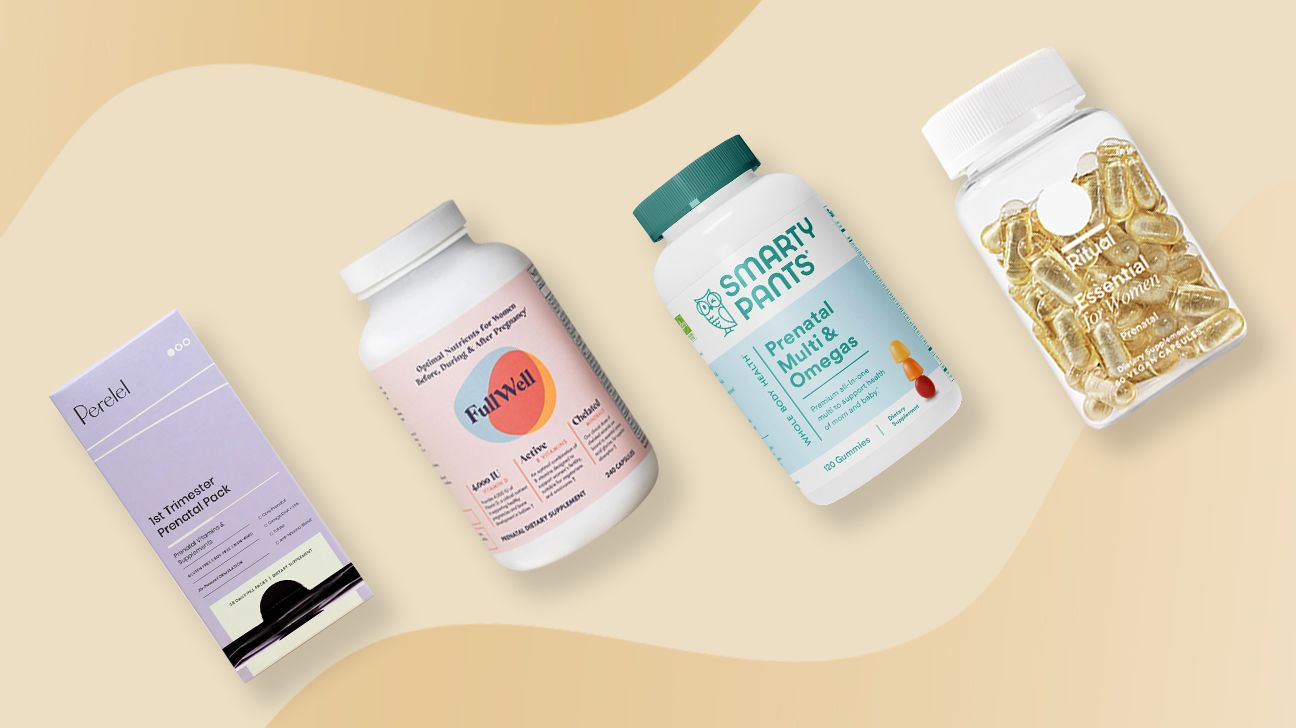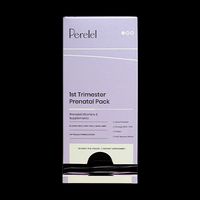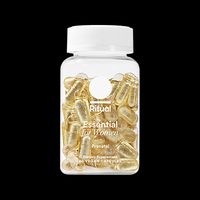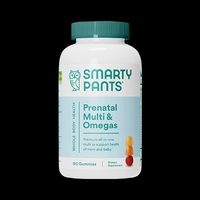Registered dietitians selected the best prenatal vitamins based on nutritional needs and key ingredients. On the list are Ritual, MegaFood, FullWell, SmartyPants, and more.
A quick look at the best prenatal vitamins
- Best trimester-specific prenatal vitamins: Perelel Prenatal Pack | Skip to review
- Best prenatal vitamins to take before you’re pregnant: Ritual Prenatal Multivitamin Capsules | Skip to review
- Most comprehensive prenatal vitamins: FullWell Prenatal Multivitamin | Skip to review
- Best prenatal vitamins with iron: Thorne Basic Prenatal | Skip to review
- Best prenatal vitamins for vegetarians: MegaFood Baby & Me 2 Prenatal Multivitamin | Skip to review
- Most affordable prenatal vitamins: Nature Made Prenatal Folic Acid + DHA Softgels | Skip to review
- Best gummy prenatal vitamins: SmartyPants Prenatal Formula Gummies | Skip to review
- Best prenatal vitamins for morning sickness: New Chapter Advanced Perfect Prenatal Multivitamin | Skip to review
Even if you’re eating a balanced diet, the increased nutrient demands during pregnancy are difficult to meet with diet alone. Enter prenatal vitamins.
Whether you’re looking for a pregnancy vitamin that will stay put when morning sickness hits or you just want something that tastes good, we rounded up eight great options to consider, including a few that our editors have used to support their pregnancy and postpartum journeys.
Note: All the prenatal supplements on our list with tester feedback were purchased independently. Further, our opinions are ours alone and have not been reviewed, approved, or otherwise endorsed by the supplement manufacturers.

A note on price
General price ranges are indicated below with dollar signs ($ to $$$). One dollar sign means the product is rather affordable, whereas three dollar signs indicate a higher cost.
Most of these vitamins are packaged to contain 30 servings — about a month’s worth. Some may be sold in 60- or 90-serving packages.
We based the price ratings on the approximate monthly cost for each product:
- $ = under $30
- $$ = $30 to $40
- $$$ = over $40
Healthline’s picks for the best prenatal vitamins
Best trimester-specific prenatal vitamins
Perelel Prenatal Pack
4.5 (141+) from Perelel

- Form: capsule
- Dose: 1 packet (5 capsules) per day
- Certifications: third-party tested for purity and potency, non-GMO
- Price: $$$
Healthline’s review
Perelel is a subscription service that delivers prenatal supplements tailored to your pregnancy trimester.
For example, the First Trimester Prenatal Support Pack contains extra folate, as well as added B6 and ginger to reduce nausea.
The company was founded by an OB-GYN, and each product is free of artificial additives and third-party tested for accuracy and purity.
The First Trimester pack includes five capsules, which may be difficult to tolerate if you have morning sickness. However, the company recently released a powdered form of its First Trimester Pack as an alternative that may be easier for some people to tolerate.
What our tester says
Pros & cons
Product details
Best prenatal vitamins to take before you’re pregnant
Ritual Prenatal Multivitamin Capsules
4.4 (733+) from Ritual

- Form: capsule
- Dose: 2 capsules per day
- Certifications: third-party tested for purity and potency, Non-GMO Project verified, Made Traceable
- Price: $$
Use code “HEALTHLINE” for 25% off.
Healthline’s review
Ritual Prenatal Multivitamin Capsules is our pick as one of the best to take before you get pregnant because it provide 12 key nutrients to help support you and your baby before, during, and after pregnancy.
Each 2-capsule serving provides 167% of the daily value (DV) for folate, an essential vitamin that’s important to take before you get pregnant to reduce the risk of spina bifida and other neural tube irregularities.
Other notable nutrients include more than 100% of your daily needs for vitamin D and B12, as well as DHA omega-3, which is often missing from prenatal vitamins.
Another added bonus is that the capsules are designed to be easier on your stomach than some other supplements, so you can take them with or without food.
Just keep in mind that because the prenatal is designed to bridge nutrient gaps in your diet, it isn’t as comprehensive as others on our list, which may be an important downside for some.
For example, one serving provides only 10% of the recommended amount of choline, a nutrient that’s essential for fetal health and development.
However, the company recently released a Natal Choline supplement that can be added to your subscription for an additional $12 per month to meet 100% of your choline needs.
This prenatal is also low in the essential mineral magnesium and is missing several vitamins that are important during pregnancy, such as vitamins, A, C, and B6. Because of this, it’s important to follow a well-rounded diet rich in these nutrients to make sure you’re covering your daily needs.
What our tester says
Pros & cons
Product details
Most comprehensive prenatal vitamins
FullWell Prenatal Multivitamin
4.5 (311+) from FullWell

- Form: capsule
- Dose: 8 capsules per day
- Certifications: third-party tested for purity and potency, non-GMO
- Price: $$$
Healthline’s review
FullWell Prenatal Multivitamin was designed by dietitian and fertility expert Ayla Barmmer, and it’s one of the most comprehensive multivitamin brands on the market.
Each serving covers 55% of recommended choline needs and provides 4,000 IU of vitamin D per dose. It also includes folate (folic acid) in the form of methylfolate, a more absorbable form of the nutrient.
It does not contain iron, but this may be a positive aspect for some because iron intake and needs differ from person to person during pregnancy. However, if you need help meeting your iron needs, the company offers an iron supplement that’s formulated to be easy to digest.
Similarly, because it doesn’t contain omega-3s, this product should be combined with the company’s DHA and EPA supplement.
FullWell Prenatal Multivitamin is highly rated, with customers mentioning how easy it is to digest. Several also say they’ve noticed increased energy levels since switching to this product.
What our tester says
Pros & cons
Product details
Best prenatal vitamins with iron
Thorne Basic Prenatal
4.5 (5k+) from Amazon

- Form: capsule
- Dose: 3 capsules per day
- Certifications: gluten-free
- Price: $$
Healthline’s review
Thorne Basic Prenatal contains 167% of the DV for iron during pregnancy, making it a good option if you’re looking for a prenatal vitamin with iron.
What’s more, it features ferrous bisglycinate, a form of iron that may be easier on the stomach and less likely to cause constipation.
Other highlights of this prenatal include choline and folate to support fetal brain and spinal cord development during the early stages of pregnancy, as well as additional calcium and vitamin D to support increased needs during breastfeeding.
According to the company, Thorne products are extensively tested for purity, potency, and quality multiple times throughout the manufacturing process, either in-house or by third-party labs.
Additionally, all products are manufactured in a facility that’s certified by NSF International and the Therapeutic Goods Administration (TGA).
Pros & cons
Product details
Best prenatal vitamins for vegetarians
MegaFood Baby & Me 2 Prenatal Multivitamin
4.7 (274+) from MegaFood

- Form: tablet
- Dose: 2 tablets per day
- Certifications: Non-GMO Project verified, glyphosate residue-free, tested for 125+ herbicides and pesticides, gluten-free
- Price: $$
Healthline’s review
Formulated with organic, plant-based ingredients, this prenatal vitamin is designed to be easily digestible and can be taken on an empty stomach.
It also contains many key nutrients for a healthy pregnancy, including iron, choline, folate, and vitamins B6, B12, and D3.
The supplement is also certified gluten-free and doesn’t contain soy or dairy products. However, while it is vegetarian-friendly, it isn’t suitable for vegans.
If you find these pills too hard to swallow, the company also offers a version of the supplement with mini pills instead.
Pros & cons
Product details
Most affordable prenatal vitamins
Nature Made Prenatal Folic Acid + DHA Softgels
4.6 (12.6k+) from Amazon

- Form: softgel
- Dose: 1 softgel per day
- Certifications: USP verified
- Price: $
Healthline’s review
This liquid softgel multivitamin is one of the most affordable and easiest-to-find options on our list.
Plus, because it contains DHA and EPA, you don’t have to worry about purchasing a separate omega-3 supplement to support your pregnancy.
Nature Made Prenatal Folic Acid + DHA is third-party tested by U.S. Pharmacopeia (USP) and has more than 35,000 mostly 5-star reviews online.
What our tester says
Pros & cons
Product details
Best gummy prenatal vitamins
SmartyPants Prenatal Formula Gummies
4.4 (23.6k+) from Amazon

- Form: gummy
- Dose: 4 gummies per day
- Certifications: NSF certified, Clean Label Project, non-GMO tested
- Price: $$
Healthline’s review
SmartyPants is a popular and easy-to-find supplement brand that offers a great option if you prefer gummy vitamins.
Specifically, the prenatal supplement features the omega-3s EPA and DHA, along with other important nutrients such as folate and B12.
Like most other gummies, this one doesn’t contain iron, which some people may prefer. Be sure to ask your doctor for a recommendation for an iron supplement if necessary.
The company also offers a certified organic prenatal version of this supplement, which is slightly more expensive.
Keep in mind that a serving of 4 gummies contains 6 grams (g), or 1 1/2 teaspoons, of added sugar. Therefore, the supplement might not be the best choice for people trying to manage their blood sugar levels, such as those with gestational diabetes.
What our tester says
Pros & cons
Product details
Best prenatal vitamins for morning sickness
New Chapter Advanced Perfect Prenatal Multivitamin
4.7 (4.7k+) from Amazon

- Form: tablet
- Dose: 3 tablets per day
- Certifications: Non-GMO Project verified, certified gluten-free by NSF, carbon-free
- Price: $
Healthline’s review
The New Chapter Advanced Perfect Prenatal Multivitamin contains 100% of your daily iron needs but is designed to be gentle on your stomach.
The supplement also contains ginger, which may help ease queasiness.
This product is made from all non-GMO ingredients and is both kosher and vegetarian-friendly.
Pros & cons
Product details
A comparison of the best prenatal vitamins for pregnancy
Having trouble deciding which prenatal is right for you? Here’s a quick look at how our top picks compare:
–
Approximate monthly cost
Daily dose
Third-party tested**
Missing key nutrients
$$$
1 packet (5 capsules)
yes
—
$$
2 capsules
yes
• vitamin A
• vitamin C
• thiamine
• niacin
• vitamin B6
• pantothenic acid
• calcium
• zinc
$$$
8 capsules
yes
• DHA
• EPA
$$
3 capsules
no
• DHA
• EPA
$$
2 tablets
no
• magnesium
• DHA
• EPA
Nature Made Prenatal Folic Acid + DHA
$
1 softgel
yes
choline
$$
4 gummies
yes
• pantothenic acid
• calcium
• magnesium
New Chapter Advanced Perfect Prenatal
$
3 tablets
yes
• choline
• DHA
• EPA
Keep in mind that many companies, including FullWell, and Ritual, offer additional supplements that provide any key nutrients that are missing in their prenatal formulas, such as DHA and EPA.
* First Trimester pack includes an additional folate supplement, which offers 278% of the DV for people who are pregnant or breastfeeding.
** Third-party testing refers to testing by a third-party laboratory to ensure purity and potency of a product.
Other helpful supplements
Complete your prenatal supplement routine
Even the best prenatal vitamins often lack certain nutrients, such as choline, omega-3s, or iron.
Therefore, it may be best to consider purchasing additional supplements as needed to fill in any gaps in your diet that your prenatal vitamin does not cover.
Here are some supplements that may be helpful:
- FullWell Women’s Fish Oil: Available on its own or in a bundle pack with FullWell’s prenatal multivitamin, this fish oil supplement provides 100 mg of EPA and 500 mg of DHA omega-3s.
- FullWell Iron Bump: For people needing additional iron, FullWell Iron Bump provides 25 mg of easily absorbable iron that’s gentle on the digestive tract.
- Ritual Natal Choline: With 550 mg of choline, this supplement can be use alongside the brand’s pre- and postnatal supplements to provide more than 100% of recommended choline needs during pregnancy and breastfeeding.
- Ritual Essential Protein Daily Shake Pregnancy & Postpartum: In addition to 20 g of protein per serving, this protein powder also provides choline, calcium, and iron to support nutrient needs during pregnancy and breastfeeding.
You can check out our roundups of the best choline, vitamin D, iron, and fish oil supplements for more options.
How we chose the best prenatal vitamins
We considered the following factors:
- Nutritional content: We included products specifically formulated to meet the nutritional demands of growing a human. We also looked for products containing forms of nutrients that are easiest for your body to absorb.
- Ingredients: We looked for supplements made from high quality ingredients and free of artificial additives and preservatives.
- Quality testing: We included products that undergo testing for purity and potency, ideally by a third-party organization.
- Firsthand product testing: We included several products that our editors have personally used to support their pregnancies.
Why Trust Healthline
1320+
vitamins, minerals, and supplements evaluated
35+
prenatal vitamins evaluated
30+
prenatal vitamin brands evaluated
How we evaluate prenatals
Our Medical Standards and Insights team has carefully researched and vetted over 11,000 products and services. We fact-check health claims, evaluate ingredients, and look into each brand’s reputation before sharing products and services on Healthline.
To choose the products on this page, we considered all the prenatal vitamins that passed our vetting process. Then, we personally tested some of them to narrow down our list even further.
How to choose the best prenatal vitamin for pregnancy
If you have pregnancy complications or other health concerns, a doctor might recommend a prescription prenatal supplement. Otherwise, consider the following factors when choosing the best over-the-counter prenatal vitamin for you:
- Included nutrients and doses: While there are several key nutrients to look for in a prenatal vitamin to support a healthy pregnancy, the best prenatal is the one that best fits your nutritional needs. Be sure to talk with your OB-GYN or other healthcare professional about necessary nutrients and recommended doses.
- Supplement type: If you dislike swallowing pills, look for a prenatal that comes in a chewable, gummy, liquid, or powdered form.
- Recommended daily dose: Some prenatals feature a one-a-day formation, while others may require taking up to eight pills daily. Be sure to consider the option that’s best for you. While only remembering to take one pill is more convenient, some people report better tolerance if they divide the dose throughout the day.
- Dietary needs: If you have any food allergies or dietary preferences, such as vegan, be sure to read ingredient lists carefully to select a product suitable for your needs.
- Third-party testing: To ensure that the contents of your prenatal multivitamin match the label, look for products that are third-party tested by an organization such as Labdoor, NSF, USP, or UL Solutions.
Important nutrients to look for in a prenatal vitamin
A well-rounded prenatal should include a variety of nutrients that are in high demand during pregnancy, such as:
- B vitamins, including folate: Your body needs eight different B vitamins. During pregnancy, your needs for these nutrients increase. Most prenatal supplements include all eight B vitamins, but some include only a few. At a minimum, a prenatal should include B12, folate, and B6.
- Choline: Choline needs increase significantly during pregnancy, as choline plays an important role in placental and fetal development. Research suggests up to 95%Trusted Source of pregnant people don’t consume enough choline. A well-designed prenatal should cover at least some of your choline needs.
- DHA and EPA: You need moreTrusted Source of these fatty acids during pregnancy because they’re important for fetal brain developmentTrusted Source. Some prenatals contain them, but most don’t. Most pregnant people take a separate DHA and EPA supplement, like a fish oil or algal oil supplement.
- Vitamin D: Although the current recommended vitamin D intake during pregnancy is 600 IU — the same as for people who aren’t pregnant — needs during pregnancy are estimatedTrusted Source to be much higher, at about 4,000 IU per day. Most prenatals contain much less, so you may need an extra vitamin D supplement.
- Iron: Iron needs increase during pregnancy. However, as iron intake varies greatly from person to person, iron should ideally be supplemented separately based on iron levels.
- Magnesium, calcium, iodine, and zinc: Needs for these minerals also increase during pregnancy, so a good prenatal will cover all or most of these.
- Vitamin A: Vitamin A is necessary for fetal eye and organ development, immune system function, and more.
These are just some of the nutrients that are in higher demand during pregnancy. A well-rounded prenatal will provide the additional nutrients your body needs during pregnancy, but it should be used as a supplement to, rather than a replacement for, a balanced diet.
Folate vs. folic acid: What’s the difference?
Folate and folic acid are two different forms of vitamin B9, a nutrient involvedTrusted Source in DNA synthesis, cell growth, and protein metabolism:
- Folate: a form that’s naturally found in a variety of foods, including leafy green vegetables, beans, nuts, and fruits
- Folic acid: a synthetic form of vitamin B9 that is often added to supplements and fortified foods
Compared with the folate found naturally in foods, folic acid is absorbed more efficiently by the body.
Furthermore, folic acid is the only form of folate that has been provenTrusted Source to prevent neural tube defects during pregnancy.
For this reason, most health organizations recommendTrusted Source taking a folic acid supplement when trying to conceive and through the first 12 weeks of pregnancy.
Read more about the differences between folate and folic acid.
But what about L-methylfolate?
Many prenatal supplements also contain L-methylfolate (also known as 5-methyltetrahydrofolate, or 5-MTHF), which is the biologically active form of folate.
Because certain genetic mutations — including the MTHFR gene mutation, which affects about 25%Trusted Source of the global population — can affect the body’s ability to efficiently convert folic acid into its active form, supplementing with L-methylfolate might be a better optionTrusted Source for some people.
In fact, a 2023 studyTrusted Source found that this form was as effective as folic acid at increasing folate levels in pregnant people, while also reducing the risk of unmetabolized folic acid in the blood. While more studies are needed, some researchTrusted Source suggests that high levels of unmetabolized folic acid may be harmful to health.
If you’re unsure which form of vitamin B9 is best for you, consult an OBGYN or other healthcare professional for additional guidance.
Why should you take a prenatal vitamin?
During pregnancy, your needs for vitamins, minerals, and trace elements increase significantlyTrusted Source to support your health and the health and growth of the developing fetus.
For example, your folate needs increase by 50%Trusted Source, and your iron needs increase by 150%Trusted Source.
These and many other nutrients are essential for fetal and placental growth and the general health of the pregnant person, which is why they’re needed in larger amounts during pregnancy.
For example, supplementing with folate before conception significantly reducesTrusted Source the chances of neural tube irregularities such as spina bifida.
Taking a prenatal vitamin that contains all the nutrients needed to support a healthy pregnancy can help reduce the risk of deficiencies and ensure you’re getting the vitamins and minerals you need to keep yourself and your baby healthy.
When should I start taking a prenatal?
Most experts recommend taking a prenatal supplement for at least 3 months before becoming pregnant to ensure adequate stores of key nutrients, such as folate.
If you aren’t already taking a daily prenatal vitamin, start taking one as soon as you find out you’re expecting. You’ll continue taking your prenatal vitamin every day during your pregnancy.
Do I need prenatal vitamins after I give birth?
Yes, experts also recommend continuing to take a prenatal supplement after you give birth, though there are also several products on the market specifically designed for the postnatal period.
This is because your body needs extra nutrients to support healing after delivery and requires more nutrients during breastfeeding. In fact, needs for many nutrients are even higher during breastfeeding than during pregnancy.
Keep in mind
While prenatal supplements can certainly help fill gaps in your diet, they’re not a one-way ticket to superhuman health throughout your pregnancy.
It’s important to read nutrition labels and balance your intake of vitamins and minerals with a well-rounded, nutrient-rich diet.
A dietitian specializing in nutrition during pregnancy can help you design a diet based on your preferences and specific health needs.
Do prenatal vitamins have any side effects?
Some people may feel nauseated after taking prenatal vitamins. Constipation can also be common, especially if your prenatal provides a large dose of iron.
If you’re having difficulty tolerating your prenatal, it’s important to talk with your doctor. Here are some general tips for preventing or reducing side effects of prenatal vitamins:
- Take your prenatal with food or in the evening, especially if you’re experiencing bouts of morning sickness.
- Choose a prenatal with a form of iron that’s less likelyTrusted Source to cause constipation, such as iron bisglycinate chelate.
- To prevent constipation, drink lots of water, increase the fiber in your diet, and get regular exercise.
- Consider trying a different form of prenatal nutrients, such as a powder or gummy supplement.
Frequently asked questions
What is the most recommended pregnancy supplement?
What is the most effective prenatal vitamin?
When should I start taking a prenatal?
Is it OK to take prenatal vitamins if you are not pregnant?
Do prenatal vitamins help you get pregnant?
Are prescribed prenatals better than store-bought ones?
The bottom line
Taking a prenatal supplement is recommended for all pregnant people. A well-rounded prenatal supplement can help you meet your nutrient needs before, during, and after pregnancy.
The prenatal products listed above are trusted by experts and can help ensure you’re getting the recommended amount of nutrients to keep you and your little one healthy.




